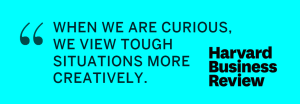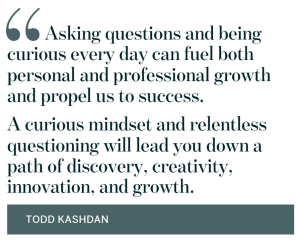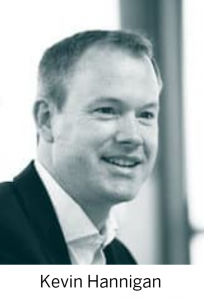In a world of change and chaos, HPC’s Kevin Hannigan explores how curiosity might see us through.
Looking at where the world is now, it is hard not to think that it is in chaos. Unprecedented technological change, political instability, war on the borders of Europe, a global grain crisis, financial instability and climate change are now part of our daily discourse.

This sense of chaos is no different in the world of business where social, political and technological changes are exacerbated by post-pandemic pressures and the phenomena of the “great resignation” and “quiet quitting”.
How do we deal with the challenges we face and how do we find new solutions that may solve some of our current problems?
In perhaps his most self-effacing quote, Albert Einstein is reported to have said “I have no special talents. I am only passionately curious”. For those of us lacking Einstein’s gifts, this quote brings great hope but also shines a light on an often under-valued trait: that of curiosity. In a chaotic world dominated by individuals loudly claiming to have answers and telling us what the future will bring, perhaps we need to celebrate the people asking questions and those intent on understanding the world a little more. Where opinion and discourse feel even more polarised than ever, surely we should be spending more time seeking alternative perspectives.
Listening to the scientific research, the case for curiosity is compelling:
Our brains are hardwired to be curious. Research from Berkley shows that we are rewarded for curiosity by dopamine, which is released in the face of a new experience. Other research shows that curiosity is associated with higher levels of positive emotions, and greater psychological well-being. It may be the case that people who are already happier tend to be more curious, but since novelty makes us feel good through the release of dopamine, it seems possible that it works both ways.
Curious people also seem not only to do better at work through greater enjoyment, but also to have a greater ability to concentrate. It also appears that a number of organisations take great steps to hire curious individuals and to hardwire curiosity into their practices. Companies such as Google and IDEO have designed their hiring practices to identify the curious and Pixar has developed an approach to idea generation called “plussing” that involves building on ideas without using judgmental language. Instead of rejecting a sketch, for example, a director might find a starting point by saying, “I like Woody’s eyes, and what if we…?” Someone else might jump in with another “plus”. This technique allows people to remain curious, listen actively, respect the ideas of others, and contribute their own.
If all this wasn’t enough, the habit and practice of curiosity also appears to strengthen our social fabric.

Curious people are more likely to expand their social circles and the outcome of meeting people from different backgrounds with different perspectives is, unsurprisingly, greater empathy. Todd Kashdan took his research one step further and found that people were rated as warmer and more attractive if they showed real curiosity in a social exchange. This implies that demonstrating curiosity towards someone is a great way to build your closeness with them. However, this isn’t just about building closeness for its own sake. Research from Dr Jodi Halpern has shown that when doctors are genuinely curious about their patients’ perspectives, both report less anger and frustration, make better decisions, leading to better patient outcomes.
In chaos theory, small differences in initial conditions can yield widely diverging outcomes rendering long-term prediction of their behaviour impossible.
This is the Lorenz “Butterfly Effect” where the flapping of a butterfly’s wings in Brazil can cause a tornado in Texas. In a complex, even chaotic world, we may not be able to control or even determine how a complex system evolves, but we can control the choices we make that determine the conditions the system faces. Our hardwired sense of curiosity, which has served us for millennia, may turn out to be the trait that we didn’t realise we needed for this era.

Kevin Hannigan leads the Learning and Talent Consulting offering and is also a Client Director at HPC. He works with clients to develop, deliver and evaluate bespoke solutions that drive performance across their business.
He is a highly skilled consultant and facilitator with a wealth of experience in designing the systems and processes that support effective learning, measurement and talent development.
Before joining HPC in 2013, Kevin was head of learning and development for Matheson, Ireland’s largest law firm and for C&C Ireland.
kevin.hannigan@wearehpc.com
Connect with Kevin on LinkedIn >>>
Connect with HPC on LinkedIn >>>